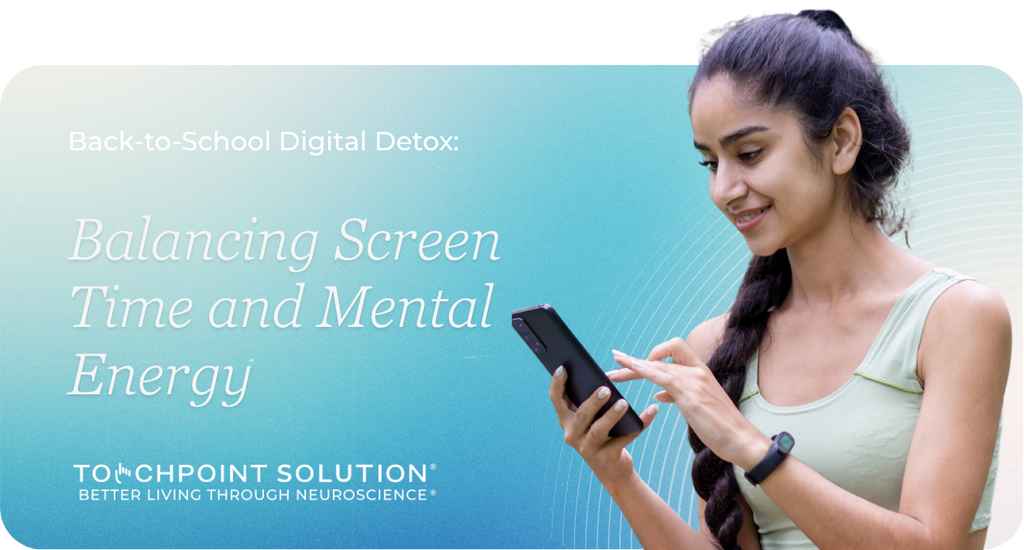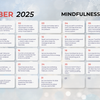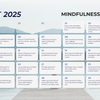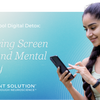Back-to-School Digital Detox: Balancing Screen Time and Mental Energy

There’s a moment every parent knows. Your child shuts their laptop after hours of virtual work, barely looks up, and then instinctively picks up their phone. You gently suggest a break, but the screen pull is strong. Their eyes are tired, their mood is off, and you both feel it, they’re mentally maxed out.
Back-to-school stress is a well-covered topic, but one piece often gets overlooked: screen overload. As students gear up for the academic year, their digital demands surge, and so does the potential risk of mental fatigue and health issues that accompany it.
When Focus Fades and Brain Rot Sets In
Between online assignments, notifications, and hours of doomscrolling, students often bounce from one screen to the next without a real mental break. It's not just their eyes that are tired, it's their brains too. That foggy, detached feeling after a long screen session? Some Gen Z students casually call it "brain rot," and it’s more real than it sounds.
Signs of digital fatigue in students (and parents) can include:
- Trouble focusing on simple tasks
- Mood swings or irritability after screen-heavy days
- Compulsive checking of apps or tabs
- Difficulty falling asleep
- A general sense of burnout or feeling “blah”
A study published in JAMA Network Open found that reducing leisure screen time to just three hours per week significantly improved psychological well-being in children and teens within two weeks, even without changes to sleep or exercise habits. The study, conducted on a large sample size, confirms that screen overload can directly impact emotional balance and mental health.
Tiny Tech Tweaks with a Big Mental Payoff
We don’t need to eliminate all technology to feel better. Instead, we can focus on creating intentional resets, moments of calm that give our brains and bodies time to recover. These intentional resets are short periods when we consciously disconnect from screens and engage in activities that promote relaxation and mental rejuvenation.
Try these simple, low-effort adjustments that don’t involve banning screens altogether:
- Tech Curfews: Power down 30 to 60 minutes before bed to help your mind shift gears
- Device-Free Zones: Try screen-free dinners or short after-school walk-and-talks
- Mindful Social Media Use: Notice which apps energize you and which leave you drained, and limit the ones that spiral into doomscrolling
- IRL First: Prioritize a face-to-face convo or stretch session before diving into another scroll loop
You’ll start to notice where time disappears and how much clearer you feel when you take just a few minutes to unplug with intention.
How TouchPoints Help Regulate Screen-Related Stress
Even with breaks, our nervous systems don’t always bounce back on their own. That’s where TouchPoints come in.
TouchPoints are not just another gadget. They are small, wearable devices that use gentle, alternating vibrations to calm the body's stress response. They are designed to be effective tools in managing the stress that often accompanies excessive screen time. Whether your student needs help transitioning out of a phone rabbit hole or winding down before bed, TouchPoints can offer instant grounding without adding another screen into the mix, giving you confidence in their ability to help.
They align especially with these TouchPoint Dimensions of Health:
- Mindfulness – helping you reset after too much digital input
- Healthy Thinking – supporting clearer emotional regulation
- Sleep – easing tension and sensory overload before rest
A few minutes of use during a screen break or after a study break can help reduce the intensity of digital fatigue and help your teen return to a more centered state of mind. This simple tool can provide a sense of relief and hope, knowing that there are effective ways to navigate the digital world without feeling overwhelmed.
A Digital Life That Doesn’t Feel Like Overload
As a parent or a teacher, you play a crucial role in shaping your child or student's relationship with technology. Guide them to use it mindfully and create opportunities for recovery. You can help them feel better, think more clearly, and avoid the drained, brain-fogged feeling that often accompanies excessive screen time.
This school year, make time for clarity. Let recovery be part of the routine.
Want to help your teen feel calmer and more focused this school year?
Shop TouchPoints and discover wearable stress relief that works, without a screen required.
-
Posted in
focus, Screen Time, Sleep, Teen Mental Health




